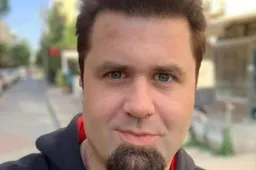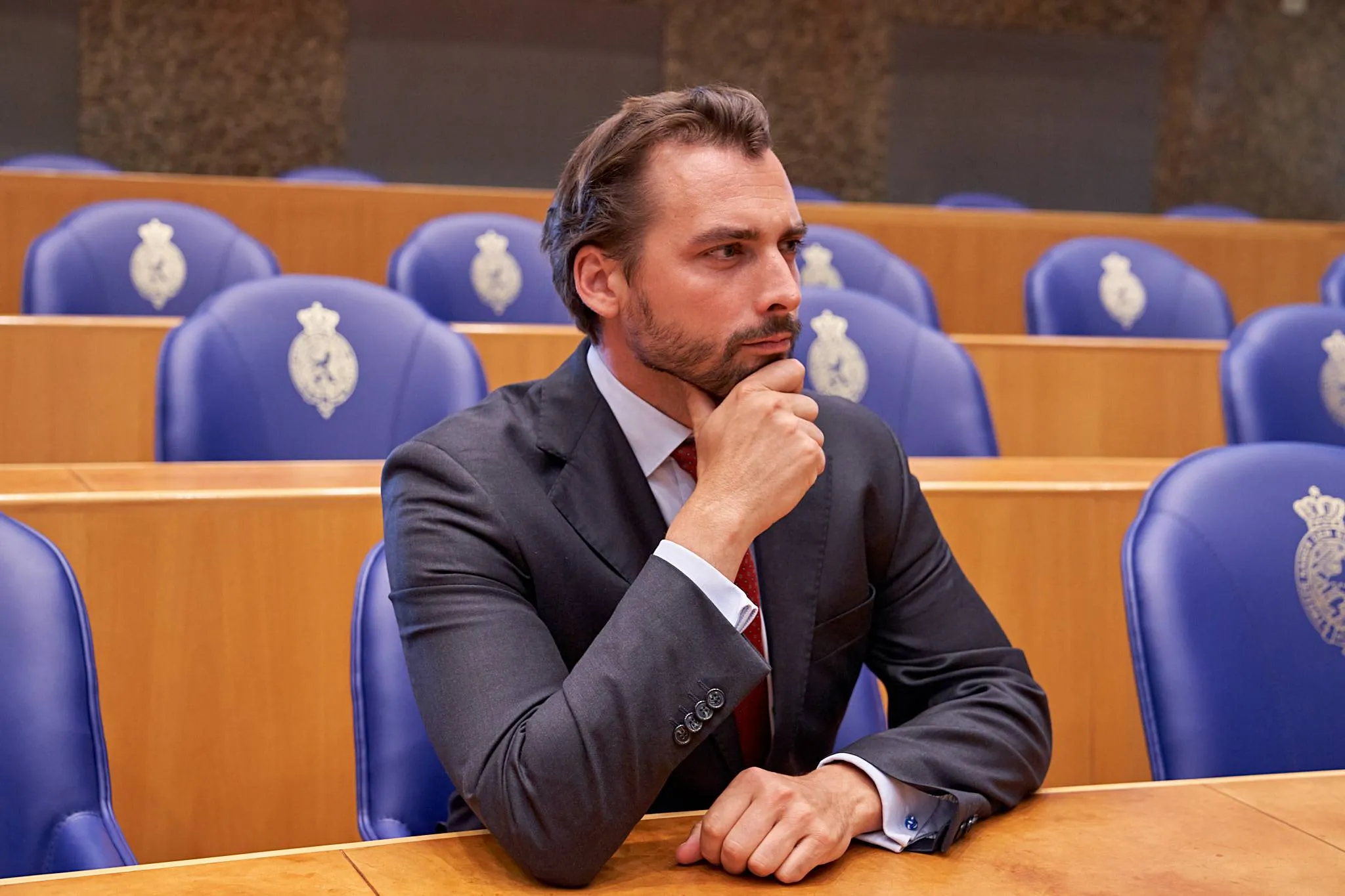Baudet in Zwitserse krant: "Onze filosofie is sterk tegen de Franse Revolutie...
Een duidelijke expositie van het gedachtegoed van Forum voor Democratie.
Afgelopen weekend postte Thierry Baudet een link naar een interview met een Zwitserse krant, Die Weltwoche. Hij had met die krant gesproken en allerlei vragen beantwoord. Vragen zoals: is hij bereid compromissen te sluiten? Wat bedoelde hij met 'boreaal'? En wat is zijn politieke filosofie nou eigenlijk?
Framers, duiders, complotdenkers, boreaal-exegeten, gespeeld-bezorgden of verwarden! In dit interview vertel ik op rustige wijze over mijn ideeën. Het is ook een optie om gewoon te kijken wat ik zelf zeg ipv steeds in het wilde weg te hinein-interpreteren. https://t.co/spjfcbqJ5q
— Thierry Baudet (@thierrybaudet) March 31, 2019
Baudets antwoorden zijn buitengewoon interessant.
Om te beginnen legt hij uit dat het grote verschil tussen FVD en het partijkartel is dat die laatste zich vooral bezighoudt met "de emancipatie van het individu." Dat is "het grote doel" van elke politieke filosofie van de andere partijen. Forum voor Democratie staat daar anders in. Die partij verzet zich tegen alles waar de Franse Revolutie voor stond, aldus Baudet.
"I don't see a fundamental difference between the classical Liberal Party (or whatever they call themselves), the Christian Democratic Party, the Labor Party, the Socialist Party and the Green Left Party. To me, all are basically the same. They are all representatives of the "liberal" or "liberalist" philosophy where emancipation of the individual is the ultimate aim. Maximum equality, maximum individual liberty...
"[O]ur position with regards to all the major questions of our time is not gradually different. It's fundamentally different. We represent a political philosophy that is fundamentally different. We want things that are contradictory to the political spectrum that has dominated the West since the French Revolution."
Oftewel:
"Ik zie geen fundamenteel verschil tussen de klassieke Liberale Partij (of hoe ze zich ook maar noemen), het CDA, de PvdA, de SP en GroenLinks. In mijn ogen zijn ze allemaal hetzelfde. Ze representeren de 'liberale' of 'liberalistische' filosofie waarin emancipatie van het individu het grote doel is. Maximale gelijkheid, maximale individuele vrijheid...
"Onze positie met betrekking tot alle grote vragen van onze tijd is niet 'gradueel' anders. Het is fundamenteel anders. Wij representeren een politieke filosofie die fundamenteel anders is. We willen dingen die het tegengestelde zijn van het politieke spectrum dat het Westen sinds de Franse Revolutie gedomineerd heeft."
Maar wat is de filosofie van Baudet zelf dan precies? Hij legt uit:
"It’s the philosophy that starts from the understanding that we are paradoxical beings. We want to be free and, at the same time, we want to be embedded. We want to be individuals, but we also want to be members of a group. In a proper society, there's an equilibrium there, a delicate balance that has culminated in what we might call 'the individual properly understood.' This reached its apex, I believe, in the eighteenth century, and was venerated in that great 'swan song of aristocracy', the nineteenth century. But now the individual has, of course, been “liberated” to an extent that we feel deeply atomized and unhappy. We don't know how to get back to the community anymore."
Oftewel:
"Het is de filosofie die begint met het begrip dat we paradoxale wezens zijn. We willen vrij zijn, maar tegelijkertijd willen we deel uitmaken van iets dat groter is dan ons. We willen individuen zijn, maar we willen ook bij een groep horen. In een gezonde maatschappij is er een equilibrium, een delicate balans dat culmineert in wat we 'het individu op juiste wijze begrepen' kunnen noemen. Ik geloof dat dit haar hoogtepunt beleefde in de achttiende eeuw, en geëerd werd in dat tijdperk dat het einde van de aristocratie inluidde, de negentiende eeuw. Maar nu is het individu natuurlijk 'bevrijd' tot zo'n hoogte dat we ons eenzaam en ongelukkig voelen. We weten niet meer hoe we een gemeenschap kunnen vormen."
Dit in tegenstelling tot de 'libertijnen' en communisten:
"I think that under the influence of cultural Marxism, which started in the 1920s and became dominant in the 60s, intellectuals, politicians, artists, academics, journalists and, as such, the entire elite of our society have been bewitched by that idea. They came to believe that what stands in the way of utopia — whether a communist utopia or a liberal utopia — is bourgeois society, bourgeois traditions, the bourgeois way of life of ordinary people."
Vertaald:
"Ik denk dat onder invloed van het cultureel Marxisme, wat in de jaren 20 van de vorige eeuw begon en dominant werd in de jaren 60, intellectuelen, politici, kunstenaars, academici, journalisten etc. -- de hele elite van onze maatschappij -- behekst zijn door dat idee [van de oikofobie]. Ze gingen geloven dat wat in de weg staat van De Utopie -- of dat nou een communistische utopie of een liberale utopie -- de bourgeois maatschappij is, bourgeois tradities, de bourgeois manier van leven van gewone mensen."
En ja, ook liet Baudet zich van zijn ouderwetse kant zien:
"I don't think it's possible to understand Europe and to understand the intimacies, the incredibly subtleties of the European spirit, without a deep understanding of European art. It's exemplary of the wickedness of the left and of the European Union, of liberal philosophy and globalist views, that they are so supportive of modern art and modern architecture, that they listen to pop music and propagate 'ghetto' lifestyles."
Oftewel:
"Ik denk niet dat het mogelijk is om Europa echt te begrijpen, de subtiliteiten van de Europese geest, zonder een diep begrip van Europese kunst. Het is exemplarisch van de slechtheid van links en de Europese Unie, van de liberale filosofie en globalistische denkbeelden, dat ze moderne kunst en moderne architectuur zo steunen, dat ze naar popmuziek luisteren en 'ghetto' lifestyles propageren."
Voor iemand het vraagt: ja, ik luister wel naar popmuziek en zelfs naar hiphop. Dat is ongetwijfeld dan ook waarom ik een conservatieve libertariër ben, en geen diehard conservatief zoals Baudet (of moet ik zeggen reactionair -- een term waarmee hij overigens vrijwel zeker geen moeite mee zal hebben, aangezien hij in het gesprek ook hardop zegt de klok terug te willen draaien).
In dat verband zegt hij ook iets interessants -- waarvan ik niet weet of alle FVD-stemmers het ermee eens zijn (hoewel een flink aantal zeker wel, met name de hoger opgeleide achterban):
"Well, it's obviously true that the general public has always had folklore, and I don't expect 17 million people in the Netherlands to be able to reproduce the finer harmonic intricacies of Schumann's Piano Concerto. But society needs an elite that leads the way."
Dus:
"Nou, het is natuurlijk waar dat het grote publiek altijd folklore heeft gehad, en ik verwacht niet dat 17 miljoen mensen in Nederland in staat zijn om de fijnere harmonische complexiteit van Schumann's pianoconcert te reproduceren. Maar de samenleving heeft een elite nodig die de weg wijst."
Met andere woorden, het geloof in een elite maakt wel degelijk een belangrijk deel uit van Baudets filosofie. Alleen dan een elite die a) altijd in gesprek is met het volk, onder meer via referenda, b) én een elite die de oude tradities respecteert, waardeert, en verdedigt. Baudet heeft dit al vaker gesteld, maar het is interessant dat hij daar in dit interview dieper op ingaat.
Tot slot is er dit:
"I think movements that have attempted to pin down esthetic principles and have tried to force them on the outside world — like Fascism, for example — have totally failed. I mean, Fascist architecture, to me, is very obviously missing the point, right? It shows that fascism is, at heart, a modernist movement. It's an oikophobic futurism, not a traditionalism."
Wat neerkomt op:
"Ik denk dat bewegingen die geprobeerd hebben om esthetische principes vast te pinnen en op te leggen aan de buitenwereld - zoals het fascisme bijvoorbeeld - compleet hebben gefaald. Ik bedoel, de fascistische architectuur mist duidelijk het punt, toch? Het laat zien dat het fascisme van nature een modernistische beweging is. Het is een oikofobisch futurisme, geen traditionalisme."
En daar hebben we de term die écht de beste beschrijving is voor FVD en Baudet: traditionalistisch.
Afijn, een mooi, interessant interview -- niet alleen voor mensen die Baudet en FVD normaal gesproken een warm hart toedragen, maar ook voor zijn critici.



